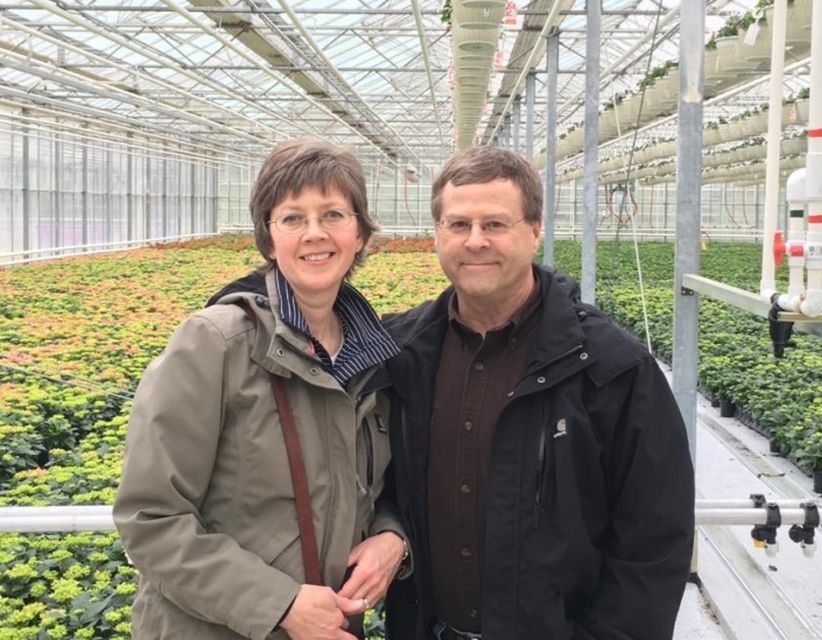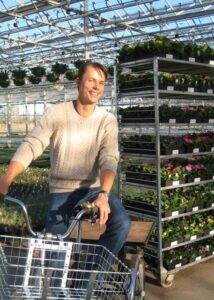Is Going Lean the Antidote for Your Labor Shortage?

Elizabeth and Rick Peters at The Peters Company teach the lean philosophy to manufacturers in person and online. Photo: The Peters Company
It’s June — have you made it through spring yet? Imagine handling the annual crunch time with an ample number of employees, working little to no overtime, yet producing high-quality product, and more of it, while keeping your customers happy at the same time.
“At our company, we have almost zero turnover rate,” says Chris Robinson, co-owner of Robinson Nursery just outside of Portland, OR.
These days, labor shortages top the list of daily challenges for just about every green business in the U.S. and Canada. But Robinson says his company has not only won the struggle but is becoming an industry leader by centering its efforts on creating both lean production processes and a lean working culture.
“Even through COVID, when there’s a mass labor exodus in almost every industry, I don’t think we had anyone quit,” he says.
Lean is the buzz term for the philosophy behind Toyota’s world-renowned vehicle production system. Since the early 1950s, the automaker has famously mastered “the relentless pursuit of waste” helping employees work smarter, not harder and increasing productivity in leaps and bounds, according to Rick and Elizabeth Peters at The Peters Company. The couple teaches the lean philosophy to manufacturers in person and online.
R-E-S-P-E-C-T for Workers
“You’d be amazed at how much waste there is in a typical organization,” says Rick Peters.
The goal is to eliminate any part of the production that doesn’t increase the value of the product but increases its cost, such as extra handling, extra product movement, or extra inventory sitting around waiting to be worked on. And then, making the product flow like an assembly line.
Why is lean a big advantage to growers who are having trouble finding labor?

Gary Cortés co-founded Flow Vision, a lean business and supply chain consulting firm in Parker, CO. Photo: Gary Cortés
“[They] can maintain the same volume and output with fewer people … [they] don’t have to hire new people because it gets more product out,” says Gary Cortés, who co-founded Flow Vision, a lean business and supply chain consulting firm in Parker, CO.
It’s a win for employees, too. To help a company figure out how to run more efficiently, Rick Peters says everyone in the organization gets involved, empowering even front-line employees. So, a small team might spend a week looking at creative ways to improve their shipping practices.
“It’s not just the boss handing down an edict,” says Elizabeth Peters. “It engages people doing the work. That’s showing respect for people doing the work because they’re adding value for the customer.” In the lean universe, she says people are considered “the most valuable asset.”
“If we get [employees] involved, they’re going to have buy-in,” agrees Cortés. He says leaner production makes the job easier for employees, too, “so that at the end of the day after eight hours, nine hours, you don’t feel tired, but you got a lot more done than you did in the previous way of doing it.”
Better Worker Retention
Lean processes lead to happy workers.
“If companies are able to eliminate a lot of waste out of their organization, that will free up capital,” says Rick Peters.
When that happens, a portion of the capital typically goes towards things like better wages and benefits.
“They do this because they want to retain their employees,” he says.
Robinson Nursery has focused on lean for more than a decade. Today it employs 145 team members.
“People feel like they have a good career here,” Robinson says. “We have really good compensation packages. That’s the foundation of keeping people, making sure they feel taken care of and that they can live beyond basic needs.”
The nursery offers bonuses, health insurance, and a 401K company match program to its employees, which helps with worker retention.
“We’re trying to have a higher profit margin; we’re trying to be more efficient; we’re trying to get better compensation packages; and we’re trying to be more innovative every day,” he says.

Ben Verhoeven, President of Peoria Gardens in Albany, OR, says the lean process transformed his relationship with his employees. Photo: Peoria Gardens
On a Lean Journey
“It’s been a lot of work, and a lot of fun and also a lot of blood, sweat, and tears,” says Ben Verhoeven of Peoria Gardens, a western Oregon nursery. “To really do it, I think you’ve got to be all in.”
In 2019, Verhoeven hired the Peters family to help his company become leaner. Verhoeven says the process transformed the relationship he has with his approximately 27 employees.
“We’re really working hard on our culture of respect, accountability, and mutual trust among other things,” says Verhoeven. “That culture part goes hand in hand with lean.”
A leaner company will be nimbler.
“It gives me a tremendous amount of confidence that we can weather things like increased pricing and labor shortages,” Verhoeven says. “Now all of a sudden, I have a broad knowledge base … of how to apply proven methodology tools to problems.” And a supportive team.
Learn More About Lean Production Philosophy
To read more about the lean production philosophy, there are several resources available, including the book The Lean Turnaround by Art Byrne. James P. Womack and Daniel T. Jones authored the book Lean Thinking. “Lean” is the buzzword for the philosophy behind Toyota’s world-renowned vehicle production system. Read more about its system at https://is.gd/toyota_lean_vision.









